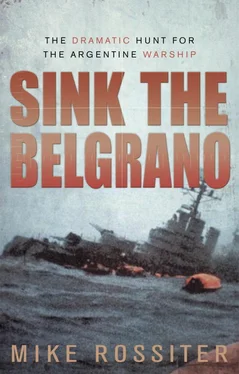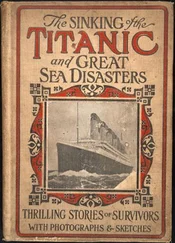The first actual landing on their treeless terrain was by Captain John Strong of the Royal Navy in 1690, and it was he who named the channel between the two major islands after Anthony Cary, 5th Viscount Falkland, who was later to become First Sea Lord. It took another seventy years before any further interest was shown in the Falklands, and this time it was by the French, who were the first to settle on them – on East Falkland in 1764 – christening them Les Malouines, because many of these French settlers came from the port of St Malo in Brittany. This attempt to occupy the islands drew the wrath of the Spanish government, who considered that the previously ignored archipelago was so close to their vast empire in South America that it fell legitimately within their sphere of interest, and they objected strongly to the French presence. The French gave way, and in 1766 formally transferred the settlement to Spain. The Spanish then placed the islands under the jurisdiction of the province of Buenos Aires, and a Spaniard, Don Felipe Ruiz Puente, became governor of the islands, with Malouines becoming the Spanish Malvinas. This was the first recorded instance of an attempt to establish some legitimate sovereignty over the islands.
The story might have ended there had not Commodore John Byron arrived on the island of West Falkland roughly at the same time as the French were settling on East Falkland, and claimed it for Britain. A year later a British settlement was established in Port Egmont on Saunders Island in West Falkland, in apparent ignorance of the French attempt at colonization in what is now Stanley and in the face of Spanish objections.
The British outpost survived for four years, during which Britain and Spain exchanged diplomatic letters about the legitimacy of the settlement, until in 1770 the Spanish made a determined effort to close the question of the islands’ governance once and for all. They sent a force of 1,400 soldiers, backed by five warships, to eject the British and eradicate Port Egmont. However, this expedition was not as decisive as the Spanish authorities on the mainland had hoped. The British settlers left, but the British government threatened war, and the Spanish government allowed the settlers back the following year, while declaring that in doing so Spain was not modifying its claim of sovereignty. Three years later the British colony was closed down voluntarily because supporting it had become too great a drain on British resources at a time when every effort was being made to hang on to the colonies in North America.
Once again the Falklands were forgotten as the European empires fought each other for advantage in other parts of the world, and Spain itself became a battleground in the global conflict between Britain and France. When Spain was occupied by Napoleon’s forces, the Spanish colonies in South America took the opportunity to seize their freedom. In 1810 the United Provinces of the Rio de la Plate declared their independence from Spain and eventually in 1816 constituted themselves as the country of Argentina, claiming all those lands and territories that had once come under the jurisdiction of the Spanish authorities in Buenos Aires, as the Falklands, or Malvinas, had. It is on this that the subsequent claim of Argentine sovereignty is based.
But it is one thing to claim sovereignty; it is another thing altogether to exercise it. All attempts by Argentina to impose their authority over the islands resulted in a conflict with a more powerful state, and ended in frustration. In 1829 the new Argentine government in Buenos Aires gave Louis Vernet, as military governor of the islands, the right to establish a colony and to make money out of trading in hides, meat, wool and sealskins. Britain sent a diplomatic note of protest, but did nothing else. However, Vernet ordered several United States fishing vessels to be seized, arguing that they were fishing in Argentine waters without the appropriate licences from the Argentine government. This brought retribution from the United States in the form of the USS Lexington , a warship that sailed to the Falklands in 1831, arrested the inhabitants and laid waste to the settlement, leaving all the buildings destroyed.
Sensing an opportunity, the Admiralty in London then dispatched two British warships to the islands, which arrived in December 1832. At the same time, the Argentine government sent its own gunboat and a new military governor, but the forces under him mutinied and he was unable to resist the Royal Navy or prevent British forces landing and claiming the Falklands for Britain.
In a brutally succinct explanation of its actions, the British government wrote:
The British government at one time thought it inexpedient to maintain any garrison in those islands: it has now altered its views and has deemed it proper to establish a post there. His Majesty is not accountable to any foreign power for the reasons which may guide him with respect to territories belonging to the British Crown.
The Falklands became one more red dot on the global map of Empire, and few countries at that time, certainly not Argentina, were prepared to force war upon Britain. Diplomatically, however, with the exchange of notes and letters, the Argentine government protested, and continued to do so.
With the end of the Second World War, a huge anti-colonial movement forced the dismantling of most of the empires of the European states. Not only was there a large and powerful demand for independence and self-determination, but the old imperial powers, particularly Britain, found the costs of hanging on to empire too great to bear. In Argentina, a military coup in 1943 had brought a young colonel, Juan Perón, into the government. In 1946 he was elected President on a policy of national regeneration, and he started to raise the question of the Falklands in the newly created United Nations. Argentinian politics grew extremely violent during the 1950s, with the armed forces, particularly the navy, attempting to overthrow Perón’s government. In June 1955 navy aircraft bombed a Peronist rally in the main square, Plaza de Mayo, in Buenos Aires, killing 364 civilians in a failed military coup; another one in September of that year succeeded in ousting Perón from power.
Whatever happened to the Argentine government, however, the claim for the Malvinas was pursued in the United Nations, and in 1965 Argentina successfuly won a Resolution of the General Assembly calling on Britain and Argentina to negotiate a peaceful solution to the problem of the Falklands. The British government’s position was that they could not ignore this Resolution, nor would they really want to, but neither could they immediately accede to Argentine demands. They took the view that what were paramount were the wishes and the right to self-determination of the indigenous population. This was an important negotiating tactic, because it helped to defend British interests in other disputes over possessions like Gibraltar, Belize and Northern Ireland. The population of the Falklands was small, but was almost wholly composed of people who could trace their ancestry over several generations to settlers who had been of British origin. That these settlers were determined to remain British was something that the British government was only slowly to become aware of.
Negotiations started between representatives of Britain and Argentina, but they soon hit the reef of the problem of the Falklanders’ interests. The Argentine government wanted nothing less than a full transfer of sovereignty, but the effect of any caveat imposed by the British which was designed to protect or preserve the rights enjoyed by the islanders under the existing arrangements would necessarily reduce Argentina’s control. The negotiations could not be kept secret from the islanders either, and the more alarmed they became about the talks between the British government and Argentina, the more the issue became a domestic political question in the UK. The Falkland islanders were able, via the Falkland Islands Company, which owned over half the farms on the island, to lobby a number of backbench MPs and encourage them to start asking awkward questions of various Cabinet ministers. The problem for the British government was that it was unable to offer the Argentine government full and unfettered sovereignty, yet at the same time it was unable categorically to refuse to discuss the issue, because it was unwilling to accept the military and financial logic of a total commitment to the Falkland islanders and their defence.
Читать дальше












